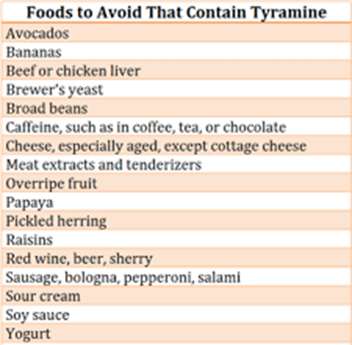A nurse teaching a patient about a tyramine-restricted diet would approve which meal?
Avocado salad, ham, creamed potatoes, asparagus, chocolate cake
Noodles with cheddar cheese sauce, smoked sausage, lettuce salad, yeast rolls
Mashed potatoes, ground beef patty, corn, green beans, apple
Macaroni and cheese, hot dogs, banana bread, caffeinated coffee
The Correct Answer is C
A. Contains foods high in tyramine like avocado, ham, and chocolate cake.
B. Includes smoked sausage and yeast rolls which are high in tyramine
C. This meal consists of foods typically low in tyramine content, suitable for a tyramine- restricted diet.
D. Macaroni and cheese, hot dogs, and banana bread can contain high levels of tyramine

Nursing Test Bank
Naxlex Comprehensive Predictor Exams
Related Questions
Correct Answer is C
Explanation
Rationale for A: Inviting a family member to be present may hinder communication, especially if the family member is involved in the abuse or the client feels unsafe speaking in their presence. Privacy is crucial for encouraging open communication.
Rationale for B: Providing basic wound care is important for physical injuries, but it does not directly address promoting communication. The nurse should focus on creating a safe environment for the client to talk.
Rationale for C: Being direct and honest when speaking with the client promotes trust and open communication. Clients who are suspected of being abused may be fearful or reluctant to share information, so clear, respectful communication helps create a supportive environment.
Rationale for D: Probing the client for a factual account of the abuse may make the client feel pressured or overwhelmed. The nurse should allow the client to share information at their own pace without feeling forced to disclose details.
Correct Answer is C
Explanation
A. Providing medications against a patient's will generally requires a legal process or evaluation of capacity rather than a blanket statement of administration.
B. Clients who are involuntarily admitted might not have the right to refuse treatment initially based on the nature of the admission.
C. Involuntary admissions often allow for extended hospitalization based on the judgment of the treatment team.
D. Laws regarding restraints are generally consistent regardless of the mode of admission, focusing on safety and necessity rather than the mode of admission.
Whether you are a student looking to ace your exams or a practicing nurse seeking to enhance your expertise , our nursing education contents will empower you with the confidence and competence to make a difference in the lives of patients and become a respected leader in the healthcare field.
Visit Naxlex, invest in your future and unlock endless possibilities with our unparalleled nursing education contents today
Report Wrong Answer on the Current Question
Do you disagree with the answer? If yes, what is your expected answer? Explain.
Kindly be descriptive with the issue you are facing.
